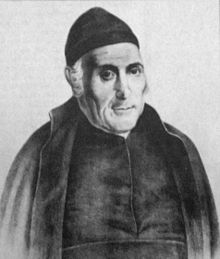Gregorio Funes
|
Déan Dean Gregorio Funes |
|
|---|---|
 |
|
| Deputee of the Junta Grande | |
|
In office December 18, 1810 – December 22, 1811 |
|
| Personal details | |
| Born | May 25, 1749 Córdoba, Argentina |
| Died | January 10, 1829 (aged 79) Buenos Aires, Argentina |
| Nationality |
|
| Political party | Patriot |
| Other political affiliations |
Saavedrism |
| Alma mater | University of Alcalá |
| Occupation | Dean |
| Religion | Roman Catholic |
Gregorio Funes (May 25, 1749 – January 10, 1829), also known as Deán Funes, was an Argentine clergyman, educator, historian, journalist and lawmaker who played a significant role in his nation's early, post-independence history.
Funes' parents were Juan José Funes y Ludueña, and María Josefa Bustos de Lara. The Funes family had arrived to Córdoba with the first group of settler led by Jerónimo Luis de Cabrera, and the Bustos family was part of a group of Spanish colonists that left Chile and moved to Mendoza and Córdoba.
Born in Córdoba, in what was then the Governorate of the Río de la Plata (a part of the Spanish Empire), Gregorio Funes was raised in privileged circumstances, and enrolled at the College of Monserrat. He studied in cloistered conditions, and shared his formative years with Juan José Castelli or Juan José Paso. Funes was ordained into the priesthood in 1773, and was named Head Seminarian; he graduated the following year, on August 10. A later dispute with the Rector of the University of Córdoba led to Funes' transfer to a minor, Punilla Valley parish.
Funes ultimately transferred, without permission from the Diocese, to the University of Alcalá de Henares (Spain), in 1779. He returned to South America in 1793, where he was named Canon of the Cathedral of Salta, and in 1804 was promoted to Dean of the Cathedral. Funes was appointed Rector of the University of Córdoba in 1807, and quickly implemented a package of reforms and modernization. Established the Departments of Mathematics, Experimental Physics, French Language studies, Music Theory, and Trigonometry, as well as donating a part of his family estate for curricular expansion. His administration replaced much of the university's Franciscan faculty for clergy from the local Diocese.
...
Wikipedia
